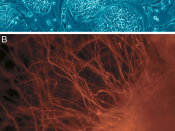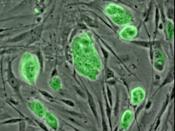Stem Cells
Stem cell research is one of the most hotly debated topics in modern science today. In short, stem cells are individual cells that have the ability to grow into a variety of the body's cells and organs. Certain stem cells are capable of differentiating into virtually any cell type, which gives great promise for the treatment of illnesses such as Parkinson's disease, Alzheimer's disease, cardiovascular diseases, diabetes, spinal cord injuries, liver failure, and many others. It is now known that stem cells can be obtained from both embryonic and adult tissues. Human embryonic stem (ES) cells are found in newly formed embryos that may be produced through in-vitro fertilization. Adult stem cells are dispersed throughout normal adults and can be in sources such as organs or blood. Each type of stem cell has certain benefits and limitations. The most important benefit of ES cells is their pluripotency, or that they can differentiate into virtually any cell type in the body.
This characteristic creates almost unlimited research potential. Scientists hope that by growing such cells in the laboratory they can program them to form specific tissue such as kidney, heart or even brain tissue that could then be used to repair damaged organs. Despite the obvious benefits, the origin of ES cells has led to an ethical debate about using cells derived from human embryos, along with the appropriateness of using federal funding to support the process. In addition to these concerns, there are questions about the safety of using ES cells in humans. Though there are legitimate concerns over its safety, it would be wrong for this new knowledge to be locked up by the government. There are too many Americans living with diseases, or even dieing, when the cure to their ailments may be right there in...



Stem Cell Research
nice essay about the issue of Stem Cell Research
0 out of 0 people found this comment useful.